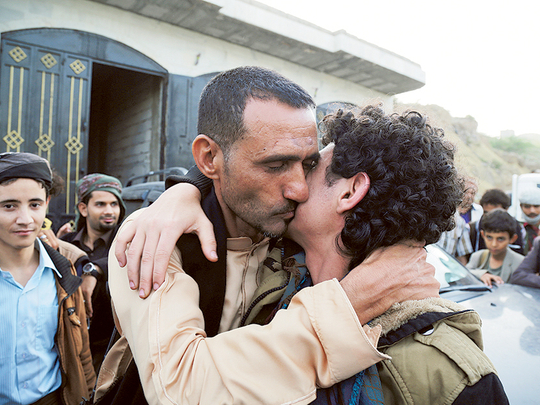
Aden: Yemen’s warring parties exchanged dozens of prisoners captured in fighting for third city Taiz on Saturday following mediation by local tribes, the chief mediator said. It was the largest such swap to take place in the embattled city since the beginning of a civil war last year, local sources said.
Saudi-backed government forces which control the city released 118 prisoners, while Iran-backed rebels who control most of the surrounding province freed 76, tribal chief Abdul Latif Al Muradi said.
Yemeni officials in the besieged city confirmed the exchange and said it was a local initiative unconnected to UN-brokered peace talks in Kuwait.
Those negotiations, now in their ninth week, have made no major breakthroughs, even on the prisoners issue.
Earlier this month, the rebels released 187 prisoners while Saudi Arabia freed 52 prisoners it was holding.
But that was far short of the target set by UN mediators for 50 percent of all prisoners to be released before the start of Ramadan.
The peace talks have also had little impact on the fighting for Taiz despite a UN-brokered ceasefire that took effect on April 11.
Just hours before the prisoner exchange, the rebels rained rocket fire on several parts of the city, residents said.
There was also heavy fighting for the town of Kirsh on the main highway to Taiz from the southern port city of Aden, where the government of President Abd Rabbo Mansour Hadi is based.
More than 6,400 people have been killed since the intervention began, the majority of them civilians, according to UN figures.
The fighting has also driven 2.8 million people from their homes and left more than 80 percent of the population in urgent need of humanitarian aid.
The threat from an emerging common enemy may be galvanising the two sides’ efforts to cooperate. Daesh militants appear to be behind a rapid uptick in suicide attacks and Al Qaida fighters continue to hold sway over swathes of Yemen, which abuts Saudi Arabia. Saudi Foreign Minister Adel Al Jubeir said on Thursday the kingdom now sought to prioritise fighting Daesh and other militants in Yemen over its desultory arm-wrestle with the entrenched Al Houthi insurgents.












